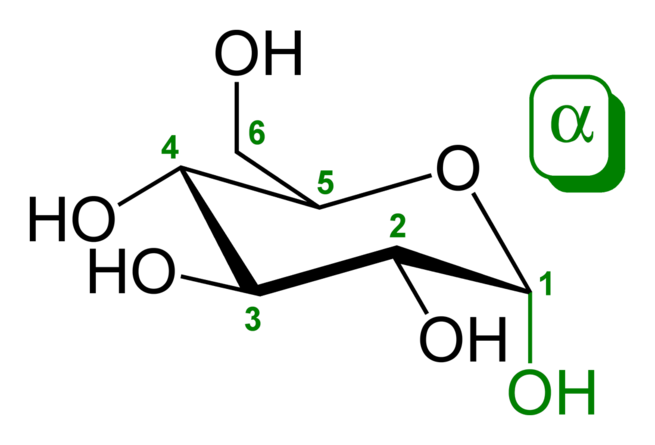
Main Difference
The main difference between Glucose and Sugar is that the Glucose is a simple sugar and Sugar is a disaccharide formed by a molecule of glucose and one of fructose
-
Glucose
Glucose (also called dextrose) is a simple sugar with the molecular formula C6H12O6. Glucose is the most abundant monosaccharide, a subcategory of carbohydrates. Glucose is mainly made by plants and most algae during photosynthesis from water and carbon dioxide, using energy from sunlight. There it is used to make cellulose in cell walls, which is the most abundant carbohydrate. In energy metabolism, glucose is the most important source of energy in all organisms. Glucose for metabolism is partially stored as a polymer, in plants mainly as starch and amylopectin and in animals as glycogen. Glucose circulates in the blood of animals as blood sugar. The naturally occurring form of glucose is D-glucose, while L-glucose is produced synthetically in comparably small amounts and is of lesser importance.
Glucose, as intravenous sugar solution, is on the World Health Organization’s List of Essential Medicines, the most important medications needed in a basic health system. The name glucose derives through the French from the Greek γλυκός, which means “sweet,” in reference to must, the sweet, first press of grapes in the making of wine. The suffix “-ose” is a chemical classifier, denoting a sugar.
-
Sugar
Sugar is the generic name for sweet-tasting, soluble carbohydrates, many of which are used in food. Simple sugars, also called monosaccharides, include glucose, fructose, and galactose. Compound sugars, also called disaccharides or double sugars, are molecules composed of two monosaccharides joined by a glycosidic bond. Common examples are sucrose (glucose + fructose), lactose (glucose + galactose), and maltose (two molecules of glucose). In the body, compound sugars are hydrolysed into simple sugars. Table sugar, granulated sugar or regular sugar refers to sucrose, a disaccharide composed of glucose and fructose.
Longer chains of sugar molecules are not regarded as sugars, and are called oligosaccharides or polysaccharides. Some other chemical substances, such as glycerol and sugar alcohols, may have a sweet taste, but are not classified as sugar.
Sugars are found in the tissues of most plants. Honey and fruit are abundant natural sources of unbounded simple sugars. Sucrose is especially concentrated in sugarcane and sugar beet, making them ideal for efficient commercial extraction to make refined sugar. In 2016, the combined world production of those two crops was about two billion tonnes. Maltose may be produced by malting grain. Lactose is the only sugar that cannot be extracted from plants. It can only be found in milk, including human breast milk, and in some dairy products. A cheap source of sugar is corn syrup, industrially produced by converting corn starch into sugars, such as maltose, fructose and glucose.
Sucrose is used in prepared foods (e.g. cookies and cakes), is sometimes added to commercially available processed food and beverages, and may be used by people as a sweetener for foods (e.g. toast and cereal) and beverages (e.g. coffee and tea). The average person consumes about 24 kilograms (53 lb) of sugar each year, or 33.1 kilograms (73 lb) in developed countries, equivalent to over 260 food calories per day. As sugar consumption grew in the latter part of the 20th century, researchers began to examine whether a diet high in sugar, especially refined sugar, was damaging to human health. Excessive consumption of sugar has been implicated in the onset of obesity, diabetes, cardiovascular disease, dementia, and tooth decay. Numerous studies have tried to clarify those implications, but with varying results, mainly because of the difficulty of finding populations for use as controls that consume little or no sugar. In 2015, the World Health Organization recommended that adults and children reduce their intake of free sugars to less than 10%, and encouraged a reduction to below 5%, of their total energy intake.
-
Glucose (noun)
A simple cellular metabolism.
-
Sugar (noun)
Sucrose in the form of small crystals, obtained from sugar cane or sugar beet and used to sweeten food and drink.
-
Sugar (noun)
A specific variety of sugar.
-
Sugar (noun)
Any of various small carbohydrates that are used by organisms to store energy.
-
Sugar (noun)
A small serving of this substance (typically about one teaspoon), used to sweeten a drink.
“He usually has his coffee white with one sugar.”
-
Sugar (noun)
A term of endearment.
“I’ll be with you in a moment, sugar.”
-
Sugar (noun)
A kiss.
-
Sugar (noun)
Effeminacy in a male, often implying homosexuality.
“I think John has a little bit of sugar in him.”
-
Sugar (noun)
Diabetes.
-
Sugar (noun)
Anything resembling sugar in taste or appearance, especially in chemistry.
“Sugar of lead (lead acetate) is a poisonous white crystalline substance with a sweet taste.”
-
Sugar (noun)
Compliment or flattery used to disguise or render acceptable something obnoxious; honeyed or soothing words.
-
Sugar (noun)
.
-
Sugar (verb)
To add sugar to; to sweeten with sugar.
“John heavily sugars his coffee.”
-
Sugar (verb)
To make (something unpleasant) seem less so.
“She has a gift for sugaring what would otherwise be harsh words.”
-
Sugar (verb)
In making maple sugar, to complete the process of boiling down the syrup till it is thick enough to crystallize; to approach or reach the state of granulation; with the preposition off.
-
Sugar (verb)
To apply sugar to trees or plants in order to catch moths.
-
Sugar (verb)
To rewrite (source code) using syntactic sugar.
-
Sugar (verb)
To compliment (a person).
-
Sugar (interjection)
Used in place of shit!
“Oh, sugar!”
-
Glucose (noun)
a simple sugar which is an important energy source in living organisms and is a component of many carbohydrates.
-
Glucose (noun)
a syrup containing glucose and other sugars, made by hydrolysis of starch and used in the food industry.
